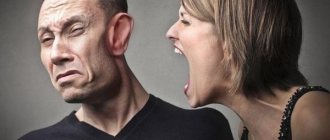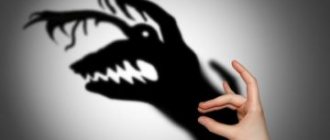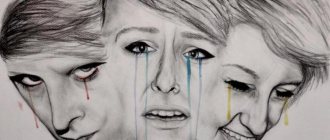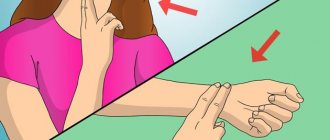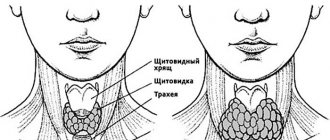Share this article on social networks
Anxiety disorder is a mental illness defined by feelings of restlessness, worry, and fear. The average person may feel anxious before visiting the dentist, but a person with an anxiety disorder may feel anxious all the time, even when leaving the house.
Many people with an anxiety disorder are not aware that they have a specific disorder, and therefore anxiety disorders are considered undiagnosed.
Important!
People with an anxiety disorder often have co-occurring mental health problems, such as anxiety-depressive disorder. Symptoms of severe anxiety disorder and panic attacks are a warning sign and increase the risk of suicide.
Description of the disease
Anxious personality disorder is characterized by persistent behavioral patterns. They manifest themselves in the fact that a person does not want to communicate with someone, he perceives criticism more acutely and considers himself inferior.
Important! The key characteristic of the disorder is the persistence of the behavior.
It develops only in adults, around adolescence. It persists throughout life, but with the competent help of a specialist, you can learn to manage this disease.
The main difficulty in diagnosis is that it is impossible to accurately establish the line between normal and pathological. Anxiety is the body's reaction to a stimulus. The problem can be combined with other phobias and diseases. The violation is identified after a conversation and passing special tests.
Important! A conversation with a psychiatrist plays a big role in identifying an anxiety disorder.
Such different phobias
A person suffering from anxiety disorders, experiencing feelings of fear and anxiety, is on the verge of transitioning to a more serious neurotic and mental illness. If fear is the fear of something real (animals, events, people, circumstances, objects), then phobia is a disease of a sick imagination, when fear and its consequences are invented. A person suffering from a phobia constantly sees objects or waits for situations that are unpleasant and frightening to him, which explains attacks of causeless fear. Having thought up and built up danger and threat in his mind, a person begins to experience a feeling of severe anxiety, panic begins, attacks of suffocation begin, hands sweat, legs become weak, lightheadedness, loss of consciousness.
The types of phobias are very different and are classified according to the expression of fear:
- social phobia - fear of being the center of attention;
- agoraphobia - fear of being helpless.
Phobias associated with objects, objects or actions:
- animals or insects - fear of dogs, spiders, flies;
- situations - fear of being alone with yourself, with foreigners;
- natural forces - fear of water, light, mountains, fire;
- health - fear of doctors, blood, microorganisms;
- states and actions - fear of speaking, walking, flying;
- objects - fear of computers, glass, wood.
Attacks of restlessness and anxiety in a person can be caused by seeing an example situation in a movie or theater, from which he once in reality received mental trauma. Attacks of unreasonable fear often occur due to the running wild of the imagination, which produced terrible pictures of a person’s fears and phobias, causing a panic attack.
Watch this video with a useful exercise “How to get rid of fear and anxiety”:
Forms of the disease
Obsessive-compulsive personality disorder - what is it?
In psychiatry, there are several types of disorders. The first is anxiety-depressive disorder. It is characterized by a constant feeling of anxiety, although there is no real reason for its occurrence. Pathological changes occur in the personality.
Anxiety-phobic disorder is characterized by the fact that the patient becomes fixated on past events that traumatized him. Sometimes the disease occurs against the background of imaginary fears, i.e. the person is pushing himself too hard.
Social disorder is manifested by the fact that a person avoids contact with others at all costs. Even if the patient is simply observed, he experiences discomfort and irritation.
Another type of disorder is adaptive phobia. It is characterized by a fear of ending up in a new place, for example, in an unfamiliar group. An organic anxiety state develops against the background of a real illness. Therefore, it is accompanied by disorientation, headaches and other symptoms.
With a mixed form, a person experiences both a depressive mood and anxious feelings.
Why does anxiety appear in the soul for no reason?
Feelings of anxiety and danger are not always pathological mental states. Every adult has at least once experienced nervous excitement and anxiety in a situation where they cannot cope with a problem or in anticipation of a difficult conversation. After solving such issues, the feeling of anxiety goes away. But pathological causeless fear appears regardless of external stimuli; it is not caused by real problems, but arises on its own.
An anxious state of mind for no reason overwhelms when a person gives freedom to his own imagination: it, as a rule, draws the most terrible pictures. At these moments, a person feels helpless, emotionally and physically exhausted, in connection with this, health may deteriorate, and the individual will fall ill. Depending on the symptoms (signs), several mental pathologies are distinguished, which are characterized by increased anxiety.
Panic attack
A panic attack usually occurs in a crowded place (public transport, institutional building, large store). There are no apparent reasons for the occurrence of this condition, since at this moment nothing threatens a person’s life or health. The average age of those suffering from anxiety for no reason is 20-30 years. Statistics show that women are more often subjected to unreasonable panic.
A possible cause of unreasonable anxiety, according to doctors, may be a person’s prolonged stay in a situation of a psychotraumatic nature, but one-time severe stressful situations cannot be ruled out. The predisposition to panic attacks is greatly influenced by heredity, a person’s temperament, his personality traits and the balance of hormones. In addition, anxiety and fear for no reason often manifest themselves against the background of diseases of a person’s internal organs. Features of the feeling of panic:
- Spontaneous panic . Arises suddenly, without auxiliary circumstances.
- Situational panic . Appears against the background of worries due to the onset of a traumatic situation or due to a person’s expectation of some kind of problem.
- Conditional situational panic . Manifests itself under the influence of a biological or chemical stimulant (alcohol, hormonal imbalance).
The following are the most common signs of a panic attack:
- tachycardia (rapid heartbeat);
- feeling of anxiety in the chest (bloating, pain inside the sternum);
- "lump in the throat";
- increased blood pressure;
- development of VSD (vegetative-vascular dystonia);
- lack of air;
- fear of death;
- hot/cold flushes;
- nausea, vomiting;
- dizziness;
- derealization;
- impaired vision or hearing, coordination;
- loss of consciousness;
- spontaneous urination.
- Why do people wake up at night: reasons for awakenings
- Obsessive-compulsive disorder - symptoms and treatment. Diagnosis of obsessive-compulsive disorder neurosis and test
- How to get rid of chronic fatigue syndrome - causes, symptoms and treatment
Anxiety neurosis
This is a mental and nervous system disorder, the main symptom of which is anxiety. With the development of anxiety neurosis, physiological symptoms are diagnosed that are associated with a malfunction of the autonomic system. Periodically, anxiety increases, sometimes accompanied by panic attacks. Anxiety disorder, as a rule, develops as a result of prolonged mental overload or severe stress. The disease has the following symptoms:
- feeling of anxiety for no reason (a person is worried about little things);
- obsessive thoughts;
- fear;
- depression;
- sleep disorders;
- hypochondria;
- migraine;
- tachycardia;
- dizziness;
- nausea, digestive problems.
Anxiety syndrome does not always manifest itself as an independent illness; it often accompanies depression, phobic neurosis, and schizophrenia. This mental illness quickly develops into a chronic form, and the symptoms become permanent. Periodically, a person experiences exacerbations, during which panic attacks, irritability, and tearfulness appear. A constant feeling of anxiety can develop into other forms of disorders - hypochondria, obsessive-compulsive disorder.
Hangover anxiety
When drinking alcohol, the body becomes intoxicated, and all organs begin to fight this condition. First, the nervous system takes over - at this time intoxication sets in, which is characterized by mood swings. Afterwards, a hangover syndrome begins, in which all systems of the human body struggle with alcohol. Signs of hangover anxiety include:
- dizziness;
- frequent changes of emotions;
- nausea, abdominal discomfort;
- hallucinations;
- blood pressure surges;
- arrhythmia;
- alternation of heat and cold;
- causeless fear;
- despair;
- memory losses.
Depression
This disease can manifest itself in a person of any age and social group. As a rule, depression develops after some kind of traumatic situation or stress. Mental illness can be triggered by severe experiences of failure. Emotional shocks can lead to depressive disorder: death of a loved one, divorce, serious illness. Sometimes depression appears for no reason. Scientists believe that in such cases, the causative agent is neurochemical processes - a failure in the metabolic process of hormones that affect a person’s emotional state.
Manifestations of depression can vary. The disease can be suspected if the following symptoms occur:
- frequent feelings of anxiety for no apparent reason;
- reluctance to do usual work (apathy);
- sadness;
- chronic fatigue;
- decreased self-esteem;
- indifference to other people;
- difficulty concentrating;
- reluctance to communicate;
- difficulty in making decisions.
Symptoms
Mysophobia - what kind of disorder is it?
Anxiety itself is a normal reaction of the body. The pathological form has several characteristic features. The first is the absence of a real threat. A person can feel fear, but have no reason for it.
Stressful situations are given great importance
The patient feels the approach of a catastrophe, he feels helplessness, danger, his consciousness is occupied by concern and doubt. He is frightened by any social contacts, so he prefers to spend time alone.
Painful anxiety leads to the fact that a person is afraid to get close to someone. On the one hand, he wants to maintain communication with someone, but he is afraid of criticism or condemnation. Gradually, the problems worsen, and it becomes increasingly difficult for the patient to maintain socialization.
It's hard to trust even a doctor. Therefore, patients do not turn to specialists for a long time, which leads to chronic anxiety. The development of a phobia can lead to neurotic disorders.
To relieve anxiety, a person can abuse alcohol. Short-term relaxation will be replaced by greater tension. As a result, he ends up in a vicious circle of addiction.
Seeking approval
This type of distorted behavior is usually characteristic of those who do not experience generalized anxiety, but are worried about a specific issue, for example, about their own excess weight. But he doesn’t seem to notice this excitement.
In this case, you can constantly ask friends and relatives: “I’m not fat, right?” Despite the fact that the question contains a denial of the fact (real or imaginary) of your excess weight, every time you say it, you remind yourself that yes, you are fat.
In addition, if you actually have problems with excess weight, and those people to whom you ask this question cannot always support you in your denial of this fact, the risk of increasing anxiety about your appearance increases even more. Since you can clearly see that even if a person answered you “yeah, she’s not fat,” he actually thinks differently.
Diagnostics
Treatment for anxiety must begin with identification and diagnosis. This disorder can be confused with other disorders. To do this, the psychiatrist uses conversation and tests.
Fear of snakes - what kind of disorder is it?
During the conversation, the patient reveals a constant feeling of tension, confidence in his own failure, non-acceptance of criticism and other characteristic behavioral traits.
Important! It is necessary to separate anxiety disorder from schizoid psychopathy, social phobia, borderline personality disorder and other problems.
Mental disorders can be difficult to differentiate. Therefore, the Spielberg-Khanin scale allows you to determine the level of anxiety, and projective techniques, Rorschach blots or others reveal the state of the individual.
An equally important role is played by observing the patient’s life, studying his socialization and behavioral characteristics.
Avoidance
It may seem that nothing is more logical than avoiding those situations that make you fear or worry. However, for those with anxiety disorders, this behavior can be described as tying a noose around your neck.
For you can be sure that if you avoid traveling on the subway because you feel somehow uncomfortable, then pretty soon you will begin to shun all other types of public transport, then taxis, and then, very likely, refuse to go out at all , plunging himself into severe agoraphobia.
In this article you can read in detail about what avoidance is in the psychology of neurotic disorders, how it appears and how it can ruin the life of anxious individuals.
Reasons for development
Anxiety syndrome can be triggered by various factors. Experts do not have a consensus on this matter. Many believe that this is heredity, which manifests itself in combination with a certain temperament.
Melancholic people are most prone to developing anxiety
Another reason that can lead to disorder is the family situation. If a child grows up in an atmosphere of condemnation, criticism, aggression, then in adolescence he will begin to show signs of anxiety.
Rejection from parents has a negative impact on the child’s psyche. It is subconsciously difficult for him to believe that someone can love him. He wants emotional intimacy, but at the same time he is afraid of it.
Sometimes serious traumatic situations lead to anxiety. For example, a partner who will beat you, or other cases of betrayal or bullying.
You won’t be able to get rid of anxiety on your own. Complex therapy is needed that will not only get rid of the symptoms, but also make the problem reversible.
Use of tablets, herbal remedies, massages, baths, etc.
What could be wrong with drinking soothing herbal teas or getting a massage? Nothing for a healthy person. But for a neurotic person who experiences anxiety for no apparent reason, all these means can only increase anxiety.
Why is this happening? There are several reasons for this.
- Firstly, if you constantly treat your VSD or depersonalization, or any other manifestations of chronic anxiety with medications, herbal medicine and physiotherapy, you place too high expectations on them, which they cannot justify.
So you can dream that “by taking eleutherococcus on your chest,” you will completely calm down, your palms will become warmer and your heart will stop beating so hard. But neither eleutherococcus, nor valerian, nor massage, nor even heavy antidepressants, in principle, have such a psychotropic effect as to change your wrong thoughts, which underlie your anxiety with all its cold arms and legs and a pounding heart.
As a result, you are even more wasted and even more frightened by the fact that again nothing helps you, and, apparently, you are seriously ill with some terrible VSD, which is incurable, or you are even going crazy.
- Secondly, treatment with a variety of naturopathy only distracts you from working with your irrational thoughts. You spend time and effort on it, but there is no result. But time and effort have already been spent. There simply aren’t any left for serious work on themselves.
- Thirdly, by getting used to drinking some kind of soothing tea or adaptogens, you are only creating another “crutch” for yourself.
Almost all neurotics have “crutches”. So those who suffer from panic and agoraphobia never leave home without a mobile phone, a bottle of water, a tranquilizer pill, chocolate and other items that will “save their life” when they are “overtaken” by an attack of severe anxiety somewhere.
For such patients, all naturopathic remedies can become just another “remedy” that must be carried with you or must be taken before something happens (before meeting management, going to the cinema, visiting a bank branch, etc. .).
At the same time, the absence of such a “crutch” is always a strong stress, so strong that it can easily lead to full-blown panic.
- Fourthly, the use of various means to alleviate your condition, often purely physically, for example, taking beta blockers with a strong heartbeat, leads to the fact that you generally lose the ability to endure any kind of vegetative discomfort. And when this discomfort does get to you (and it always does, because this is normal, this is how it should be for a living person), you are so frightened by it that you immediately fall into panic.
Treatment
In total, two types of therapy are used to correct anxiety: psychotherapeutic and medication. You don't have to go to the hospital to do them.
Psychotherapy
With the help of cognitive behavioral therapy, a person can get rid of negative attitudes. During certain exercises, he develops new behavior patterns.
Important! Sessions can only be conducted by a psychotherapist with appropriate training.
If fear appears due to certain factors, a specialist understands the reasons for their occurrence.
Drug therapy
Most often, antidepressants, tranquilizers, and B vitamins are prescribed. This kit helps restore the functioning of the nervous system and relieve anxiety. You need to be treated in courses and under the supervision of a doctor.
Dosages and specific prescriptions should only be prescribed by a specialist. With regular use of the medications, the physical symptoms will completely disappear.
How to get rid of worry and anxiety
Every person periodically experiences feelings of anxiety and fear. If at the same time it becomes difficult for you to overcome these conditions or they differ in duration, which interferes with your work or personal life, you should contact a specialist. Signs that you should not delay going to the doctor:
- you sometimes have panic attacks for no reason;
- you feel inexplicable fear;
- during anxiety, you lose your breath, your blood pressure rises, and you feel dizzy.
Using medications for fear and anxiety
To treat anxiety and get rid of feelings of fear that arise for no reason, a doctor may prescribe a course of drug therapy. However, taking medications is most effective when combined with psychotherapy. It is not advisable to treat anxiety and fear exclusively with medications. Compared to people using a combination therapy, patients who only take pills are more likely to relapse.
The initial stage of mental illness is usually treated with mild antidepressants. If the doctor notices a positive effect, maintenance therapy is then prescribed for six months to 12 months. Types of drugs, doses and time of administration (in the morning or at night) are prescribed exclusively individually for each patient. In severe cases of the disease, pills for anxiety and fear are not suitable, so the patient is placed in a hospital, where antipsychotics, antidepressants and insulin are injected.
- How to deal with depression and apathy on your own
- Agoraphobia - causes of mental disorder, symptoms and treatment methods
- Alcoholic hallucinosis - causes, types of disease, hospital treatment and prevention
Drugs that have a tranquilizing effect, but are sold in pharmacies without a doctor’s prescription, include:
- "Novo-passit". Take 1 tablet three times a day, the duration of the course of treatment for causeless anxiety is prescribed by the doctor.
- "Valerian". Take 2 tablets daily. The course lasts 2-3 weeks.
- "Grandaxin" . Take 1-2 tablets three times a day as prescribed by your doctor. The duration of treatment is determined depending on the patient’s condition and clinical picture.
- "Persen." The drug is taken 2-3 times a day, 2-3 tablets. Treatment for causeless anxiety, feelings of panic, restlessness, and fear lasts no more than 6-8 weeks.
Using psychotherapy for anxiety disorders
An effective way to treat causeless anxiety and panic attacks is cognitive behavioral psychotherapy. It aims to transform unwanted behavior. As a rule, it is possible to cure a mental disorder in 5-20 sessions with a specialist. The doctor, after conducting diagnostic tests and passing tests on the patient, helps the person remove negative thinking patterns and irrational beliefs that fuel the resulting feeling of anxiety.
Cognitive psychotherapy focuses on the patient's cognition and thinking, not just their behavior. During therapy, a person confronts their fears in a controlled, safe environment. Through repeated immersion in a situation that causes fear in the patient, he gains more and more control over what is happening. A direct look at the problem (fear) does not cause damage; on the contrary, feelings of anxiety and worry are gradually leveled out.
Prevention
It is impossible to say for sure how to properly treat anxiety. It is better to try to prevent the development of the disorder. It is necessary to develop a daily routine, give yourself proper rest and eat right.
Yoga helps you unwind and relax
It is necessary to give up alcohol and smoking, as they have a stimulating effect. You should avoid negative situations and engage in auto-training.
A large number of entertainment and activities will allow a person to be distracted from everyday life and not concentrate on failures.
Parents need to remember that the future of their children depends on them. Therefore, it is important to properly support the baby, not to judge or scold him constantly.
Chronic anxiety cannot be completely cured. You can reduce symptoms and adapt to a full life.
Development of generalized anxiety disorder
Generalized anxiety develops in people who lack self-confidence and are accustomed to reacting with fear to any life situation. They interpret the events of the world around them exclusively in negative terms. Over time, this becomes a habit, so even the slightest hint of danger begins to be perceived more acutely. Banal poisoning can be perceived as a fatal disease, and another person’s bad mood can be perceived as personal hatred towards an anxious person. Over time, anxiety will become background, constantly accompanying the person.
Important! If this condition continues for more than one month, this may be a reason for a diagnosis of generalized anxiety disorder.
How to overcome anxiety?
So, what to do if you find yourself with increased anxiety that is preventing you from living a normal life? Below I will give a few recommendations that will help you somewhat reduce your anxiety level on your own.
Drug therapy
Medicines can only be prescribed by a doctor! Most often, for high anxiety, sedatives of varying degrees of effect are prescribed. Infusions of valerian or motherwort have the mildest effects. They can be taken independently. In more complex cases, medications are prescribed by a doctor, and they can only be purchased at a pharmacy with a prescription!
Introspection
You can try to independently analyze the reasons that make you anxious. To do this, you need to take a comfortable position and make sure that no one or nothing interferes with you. And the main thing is a reserve of time. Immerse yourself in your thoughts and experiences. Try to understand what is happening in your life now? What events, people, problems make you anxious? What ways are there to resolve these problems? Are there people in your life that you could turn to for help? Or maybe you are missing something to feel comfortable? How could this be achieved?
Change of life situation
If anxious experiences are associated with any specific area - work, family status, social circle, try to change something in this particular part of your life. Start small; you don’t have to quit your job or divorce your spouse right away. Consider what changes available to you will bring you comfort and greater satisfaction. And try to put them into practice.
Communication. Psychologists have confirmed the fact that having a wide circle of contacts and close social connections significantly reduces the level of anxiety.
Sports activities. Many articles have been written about the benefits of exercise. Regular training has a beneficial effect on the human body, helping to release accumulated tension and switch to a positive mood. A beautiful figure is a pleasant bonus, it increases self-esteem, improves mood and, as a result, anxiety decreases.
Rest and sleep mode. Overwork is one of the causes of increased anxiety, so it is extremely important to take a weekend off, get enough sleep and get proper rest.
Sometimes you can reduce anxiety on your own. However, most often, only a specialist can help to effectively and long-term correct a high level of anxiety. By turning to a psychologist for help, you can work together to understand the reasons that make you anxious and change your life situation in the way that is most suitable for you, making it as comfortable and safe as possible.
Examples from life
Anxiety can also be thought of as thoughts that unreasonably run ahead. That is, a person imagines himself in a place where he is not currently present.
For example, students during a lesson fall into this state when the teacher wants to start a survey and looks at the magazine.
The only question in this situation is “why?” Because the teacher is still in thought and doesn’t know who to ask. There are many options for the outcome of this situation. If you think logically, then such a phenomenon as anxiety is completely inappropriate in this case.
But you were unlucky, and it so happened that the teacher’s gaze fell on you on the list. A person who gets ahead of himself may become constrained and, in the worst case scenario, reach the point of loss of consciousness. But in fact, nothing has happened yet. The teacher didn't even ask the question. Again, “why?”
Read more: How to learn to say no
It is important to always ask yourself the sobering question “why?”
The teacher raised the student, but until he asked a question, there was no cause for alarm.
The teacher asked a question - there is no reason for alarm. In this case, you can try to answer it.
You didn’t answer, the teacher gave you a negative grade - there is no reason to worry. You need to think about how to correct an unsatisfactory grade. Because you can’t remove a bad mark from the journal, but you can get several positive points.
Let's consider another situation that everyone has been in - waiting for a bus. In addition, if you are late, then waiting becomes an unbearably draining task. But your worry will not speed up the bus, which is quite logical. Then why worry?
Symptoms
The range of symptoms of an anxiety disorder may vary throughout the day. In this case, it is appropriate to talk about the intensity of attacks when anxiety grips a person in the morning, and about its decrease in the evening.
Or symptoms may appear within 24 hours without improvement. It is very difficult and problematic to notice the disorder, and stress and nervousness that have become part of everyday life, to which a person does not focus attention and which is an important indicator of the onset of the disease, only aggravate the situation of the patient. Symptoms of mental disorders are divided into emotional, behavioral and physical.
Emotional Signs
Behavioral symptoms
- fear of being left alone with your fears;
- inability to relax and bring oneself into a state of peace and tranquility even in a comfortable environment;
- reluctance to do previously important things due to feelings of fatigue and weakness in the body;
- rapid physical fatigue not associated with vigorous activity;
- desire to escape from problematic situations that cause anxiety;
- excessive fussiness.
Physical signs:
- pain sensations concentrated throughout the body;
- insomnia or conditions of chronic lack of sleep;
- stiffness in muscles and joints;
- episodes of dizziness and headaches;
- attacks of suffocation;
- nausea and intestinal upset leading to diarrhea;
- manifestations of tachycardia;
- frequent urge to urinate.
Why anxiety is dangerous
Increased suspiciousness, obsessive fears and high anxiety are all problems that must be dealt with. After all, constant excitement can cause various dangerous situations.
Why is increased anxiety dangerous?
- The person does not feel happy. Constant anxiety makes him feel “out of place.” This results in irritability, apathy and mood lability. Ultimately, the patient becomes unpleasant to communicate with.
- Depressive states. The constant feeling that something bad is about to happen puts pressure on a person. This can ultimately lead to depression. Sometimes it can even lead to suicide.
- Lack of success in life. Fears and worries make a person distracted and reduce concentration. Because of this, a person finds it difficult to complete tasks that he could easily cope with in a calm state.
- Real diseases as a cause of anxiety. Sometimes anxiety that comes “out of nowhere” is one of the body’s first signals about pathological changes in it. At the same time, some pathologies must be treated in the early stages, since in an advanced state they can cause complications that pose a threat to life.
- Fears can come true. There is an opinion that a person attracts situations about which he constantly thinks. This can be explained not only from a mystical point of view. For example, a person who constantly worries that his boss will not like his report may encounter this problem only because the boss senses his insecurity in his work.
- Psychosomatics as a cause of diseases. Stress is one of the main causes of many diseases. Constant unrest leads to disruption of the endocrine, nervous, immune and cardiovascular systems. In addition, stress can lead to disruption of metabolic processes. Thus, anxiety can become a provoking factor for many diseases.
When does high anxiety syndrome occur?
A distinctive feature of the syndrome of increased anxiety is constant internal restlessness and excitement, suspiciousness. Such people are afraid of illness, accidents, walks in the evening, and worry that they will not be able to cope with their work. Negative thoughts constantly pop up in your head. They play out scary scenarios in their minds over and over again and fail to find a solution to the problem.
The longer the disorder lasts, the stronger the feelings become. If a person does not seek help, fears eventually spread to all areas of life.
Constant internal tension provokes somatoform symptoms - painful sensations in the internal organs that have no organic cause. It is physical complaints that often become the leading ones when visiting a doctor.
Increased anxiety rarely occurs alone. Most patients have other additional mental health problems. Associated pathologies may be:
- specific and social phobias;
- depression;
- panic attacks, etc.
Prevalence
According to medical statistics, about 70% of people have experienced periods of increased anxiety at least once in their lives. This pathology is diagnosed in women more often than in men.
Typically, a state of increased anxiety occurs at a young age or in the period from 50 to 60 years. About 90% of children and adolescents suffer from this disorder.
What is anxiety normally?
Periodically arising anxiety and excitement are common phenomena for most people. They appear before certain important events that are about to happen in the future.
Anxiety is a dynamic state; it develops with a certain pattern. There are a number of phases in this process:
- state of internal tension;
- hyperesthesia (increased sensitivity);
- immediate feeling of fear or anxiety;
- anxious-fearful excitement.
The result of this physiological process is the search for a way out of the current situation and a solution to the problem. This is usually accompanied by various psycho-vegetative reactions (increased heart rate, sweating, pale face, etc.) and activation of energy and metabolic processes in the body. In the end, everything is resolved and the unpleasant feeling goes away.
Herbal infusions with sedative effects
Folk recipes can help in the fight against anxiety. There are many herbs that have a calming effect. Below are the most popular ones.
Folk remedies for anxiety:
- Mint tea. To prepare it, you need to brew a teaspoon of mint in a glass of boiling water. Drink the decoction instead of tea; you can add honey or sugar to it.
- Melissa with milk. This remedy not only perfectly calms, but also improves immunity. To prepare it, you need to boil a teaspoon of dried lemon balm in a cup of milk for five minutes. Add a teaspoon of honey to the resulting decoction and drink before bed.
- Motherwort decoction. In a cup you need to brew two tablespoons of motherwort greens. The mixture is infused for 4 hours. It is then divided into three parts and drunk throughout the day before meals.
Self help
Self-treatment involves following two tips:
- Tip 1. Try to reconsider your view of anxiety. Determine the exact cause of your worries and specify it. Think about whether the anxious state has a good reason, and whether you can influence the situation or change the course of events with your fears.
- Tip 2: Change your lifestyle
- Treatment of the disorder involves changes in diet. Get into the healthy habit of eating fresh vegetables and fruits every day. The vitamins they contain will strengthen the body and compensate for the lack of nutrients.
- Reduce the amount of coffee you drink to a minimum. The caffeine in its composition can cause insomnia and panic attacks. Reduce your intake of sugar, which raises blood glucose levels to the extreme and then drops sharply. This can lead to loss of strength and moral exhaustion.
- Be physically active and force your body to do any activity, be it cleaning the house or running in the morning.
- To achieve maximum results, self-treatment includes complete abandonment of habits that are harmful to the body. Alcohol and nicotine, which create false impressions of their ability to calm the nervous system, are inherently the most powerful catalysts for anxiety.
- A full and healthy sleep is 7-9 hours a day.
